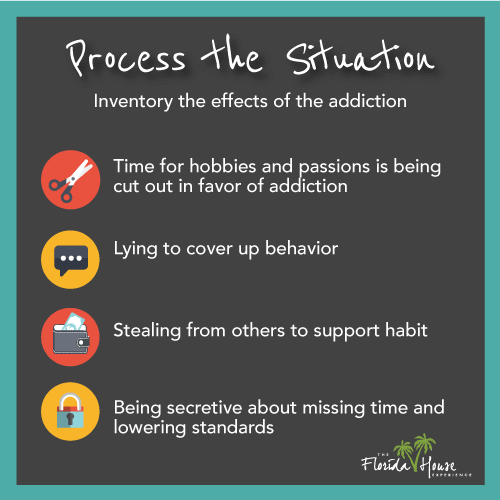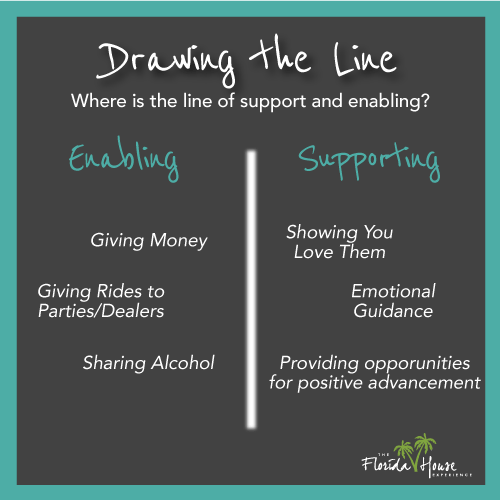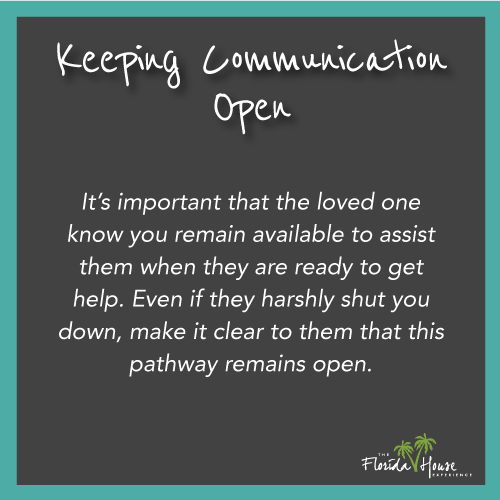
When your loved one is among the 23.5 million Americans addicted to drugs or alcohol, it’s only natural to want to help them. However, promoting treatment is rarely as easy as telling someone they need help.
In the depths of addiction, denial is very strong, and it’s not uncommon for those in the midst to become angry, aggressive or standoffish when confronted about abusive habits. It’s very likely your loved one will shut down all offers for help with their addiction. At this point, planning your next move can be a challenge. Here’s what you need to know if your loved one doesn’t want help.
Understand the Reasons for Denial
Before you approach your loved one, take a step back and consider why they’re in denial. Each person has their own motives, but generally, those who misuse drugs and alcohol may deny the problem for the following reasons:
False Sense of Control
Substance use may prevent a person from clearly seeing the hold that drugs or alcohol has on their lives. They may think or say things such as “I can quit anytime” or “I know my limits,” even if they’ve tried and failed to quit using before.
Shame
Some people may view addiction as a moral failing or weakness. As a result, they fear that admitting they have a problem and seeking treatment will change how others perceive them.
Using Substances to Cope
People may rationalize that their use of drugs or alcohol isn’t addiction because they tell themselves they’re benefiting from it in some way. Examples of language related to this reason for denial include “My work is so stressful, drinking is the only way I can relax” and “I need to keep taking this so I have enough energy to keep up with the kids and get things done around the house.”
Effect of Enablers
In some cases, loved ones enable drug and alcohol use, giving addicts the false perception that their actions aren’t harmful or problematic. Someone being influenced by an enabler might say, “Well, my sister doesn’t think it’s a problem. She gave me money to buy pills last week” or “My buddy doesn’t think I’m an alcoholic. He drinks with me all the time.”
Misconceptions About Addiction
Movies and television shows often portray addicts and alcoholics who are at rock bottom and suffering major consequences due to substance misuse. These depictions can leave people with addiction problems believing they’re not like others who use drugs or drink excessively. They may say or think, “It’s not like I’m some junkie living on the streets” or “I can’t be an alcoholic. I still get up and go to work every day.”
Process the Situation Rationally
 Addiction is a scary disease, particularly when you’re on the outside looking in and helpless to truly make a difference. However, in these moments, it’s best to stay calm, patient and rational to avoid blowing things out of proportion or reacting in a way that’s inappropriate or unlikely to help.
Addiction is a scary disease, particularly when you’re on the outside looking in and helpless to truly make a difference. However, in these moments, it’s best to stay calm, patient and rational to avoid blowing things out of proportion or reacting in a way that’s inappropriate or unlikely to help.
By processing the situation for what it is, you can gain a clearer understanding of the nature of addiction as it applies to your loved one, as well as what inherently problematic symptoms can be discussed or highlighted in the future. Pay close attention to the actual side effects of a worsening addiction, which include:
- Losing interest in relationships and hobbies
- Lying about behavior or hiding plans
- Avoiding prolonged time around family and friends
- Stealing money or making excuses to borrow money from others
- Having friends, family members or acquaintances discover missing medications, such as benzodiazepines or opiates
- Making excuses for substance use, such as a bad day or a reason to celebrate
Educate Yourself
Addiction is often seen as a situation in which the substance user’s entire life has fallen apart, but this isn’t generally the reality in the first days, weeks, months or even years. Instead of expecting the worst — or, conversely, assuming everything will be fine when that’s unlikely to be the case — take time to research addiction and arm yourself with the facts.
Addiction doesn’t look the same from one user to the next or one substance to the next. To best prepare yourself for what’s to come, read up on mental, physical and behavioral ramifications, symptoms of worsening abuse, possible long-term health risks, overdose statistics and anything else applicable to the addiction in question.
Provide Support Not Contingent on Seeking Help
All too often, family members or friends of those in active addiction offer help with strings attached, such as a place to stay only if the substance use ceases. While this may feel like an effective approach to tough love, providing help on a contingent basis may be seen as manipulative and not the tool you think it is in improving their well-being.
When you make a choice to support someone struggling with addiction, first, make sure your support won’t actively harm them. Second, a change forced upon them that they don’t truly want won’t be effective. Help that’s forced is far less effective than treatment sought independently. Instead, be all in or all out — don’t straddle the line in a misguided manipulation attempt.
Stop Enabling Behavior
 For some family members and friends of substance users, it’s easy to believe that providing money, access to substances or other enabling behaviors will help a user overcome their proclivities. Unfortunately, this is almost certainly not reflective of reality.
For some family members and friends of substance users, it’s easy to believe that providing money, access to substances or other enabling behaviors will help a user overcome their proclivities. Unfortunately, this is almost certainly not reflective of reality.
The line between support and enabling can be blurry, but when interacting with someone showing signs of addiction, it’s important to stay away from actions such as providing money for drugs, purchasing alcohol to share, lying to cover up behavior or anything else that appears to condone or normalize substance abuse. More appropriate support includes offering emotional guidance, listening to problems and offering solutions or providing resources for vocational opportunities — not facilitating the addiction.
Resist Using Guilt as a Weapon
When dealing with feelings of anger or frustration over a loved one’s challenges with addiction, lashing out is normal. Expressing emotions in hurtful ways, such as pointing out that a job loss was caused by addiction or blaming the demise of a relationship on substance abuse, may be a first instinct in trying to prompt treatments, but this isn’t a healthy response.
Guilt is rarely an effective weapon against addiction, so trying to evoke bad feelings by pointing fingers can only hurt, not help. Deep down, those living with a substance use disorder are able to connect the dots between their choices and the consequences of those choices, so your influence isn’t sharing anything new. Instead, come at these kinds of challenging times with concern and kindness, continue to celebrate successes and don’t let your negative emotions stand in the way of potential progress.
Keep Communication Channels Open
 When you express opinions, such as the importance of rehabilitation, and your loved one facing addiction fails to respond as you want, shutting down future conversations can be a powerful instinct. While this can make sense in the context of enabling behavior, cutting short all future opportunities may be a detriment in the future pursuit of treatment.
When you express opinions, such as the importance of rehabilitation, and your loved one facing addiction fails to respond as you want, shutting down future conversations can be a powerful instinct. While this can make sense in the context of enabling behavior, cutting short all future opportunities may be a detriment in the future pursuit of treatment.
It’s okay to cut conversations short if they turn to the normalization of substance abuse, but don’t close that door forever. Make sure your loved one is aware that you’re available for support or a pep talk when needed and you’ll always answer your phone when it’s warranted, even if you won’t entertain positive discussions about or rationalization of addiction.
Intervene
An intervention is often the last step in the process of trying to get a loved one to see the light, but if nothing else works, this may be your best option. Not all interventions are effective, and it’s best to try other strategies to encourage acceptance of the problem before taking this step. But when there are no other possibilities on the table and all alternate routes have fallen flat, a carefully planned intervention may be the extra push needed to admit a problem.
Seeing anyone struggle with addiction can be heartbreaking, but it’s worse when those struggling are members of your family or friend circle. Dealing with a loved one who refuses help or is living in denial is hard, but the right strategy can maintain your relationship and provide guidance for the future, even during these challenging times.
Seek Help From Experts
Navigating denial of addiction with a loved one can seem complicated and overwhelming, but you don’t need to face it alone. If you or a loved one is struggling with addiction, FHE Health is here for you. Please contact us today to learn more about our substance abuse and mental health treatment programs.






